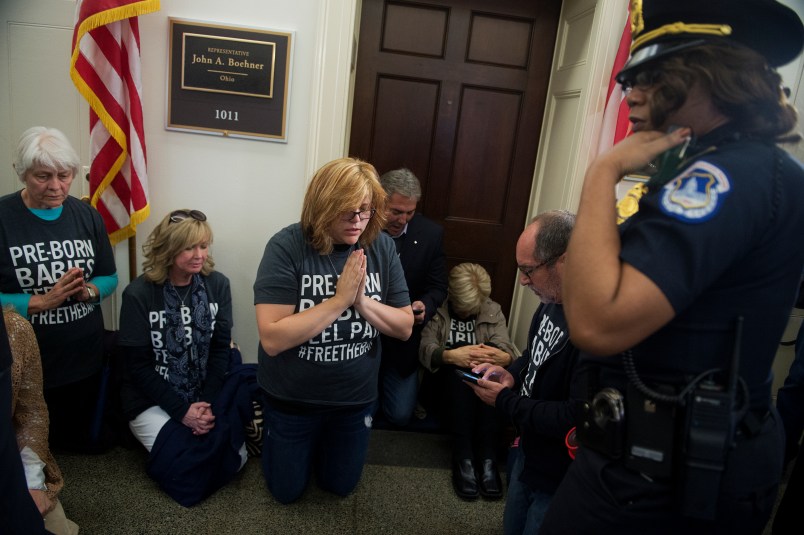“These little pain-capable unborn children of God” was just one of the phrases uttered during the U.S. House of Representatives’ recent floor vote to further restrict access to abortion. As representatives passed a ban on abortions after the 20-week mark, many used their faith as a justification for their unconscionable vote.
With the myriad ways that God was invoked on the House floor, one might reasonably assume that the Almighty had sent a gilded memorandum, replete with red letters to the Speaker of the House.
Let’s be very clear: The Bible says nothing about abortion. Anyone who tells you otherwise is offering you their inaccurate interpretation of scripture. But let me tell you what is in the Bible: compassion. Indeed, compassion and love of neighbor are common to many faith traditions.
We read in Zachariah that God proclaims: “Make just and faithful decisions; show kindness and compassion to each other.” Paul writes in Colossians that we ought to, “Put on compassion, kindness, humility, gentleness, and patience.” And in the Quran, compassion is the most frequently used word.
It’s simple: Our faith traditions call us to acts of justice and compassion. Yet that isn’t what anti-choice legislators are offering.
When the 20-week ban comes before the Senate, I would urge pro-choice Senators and reproductive justice advocates to speak in the language of their faith. We do so because decisions about reproductive health and whether and under what circumstances to become a parent are among the most sacred decisions we make.
Women seek abortions for many different reasons. God trusts and empowers us to make the best decisions for ourselves and our families. It’s not our place to judge a woman’s personal decisions. God calls us to offer compassion, respect, and support so she can be at peace with whatever decision she makes. We believe this not in spite of our faith, but because of it.
And we’re not alone.
Most Americans, most people of faith, and even the vast majority of Christians believe abortion should be legal in at least some circumstances. Despite this fact, anti-choice legislators have been pushing an agenda to force women to jump through as many hoops as possible. These elected officials have fought for 20-week bans, TRAP laws, waiting periods and funding restrictions. Taken together, anti-choice legislators have successfully put abortion out of reach for too many women who deserve access to the full range of compassionate healthcare. Our faiths call us to publicly witness that we stand with those women and demand the access to care they deserve.
Rev. Harry Knox is president & C.E.O. of The Religious Coalition for Reproductive Choice.







What does this mean? What does “say” mean? The word “abortion” isn’t in the Constitution. Does that mean it does not “say” something about the overall topic in various respects when we apply various terms? That is how people – who come to various places when doing so – apply the Bible in a way that seems to involve something relevant – something “saying” something about it – on this topic and others.
When we, as a society, get into an argument about an item like abortion, the argument is rarely about the thing itself. It is about a variety of topics that are crystallized by that issue. In this case, (1) technology and an increasing awareness that the word “life” was getting more difficult to pin down, (2) women’s rights, specifically women’s control of fertility, (3) the social implications of the disconnect between sexual identity, activity, and reproduction. All of these issues, especially women’s rights are important, but none of them (except women’s rights, and here in a very negative way) are mentioned in the bible. So textual analysis is worthless. What is tried next is to interpret the ‘meaning’ of various themes. This article poits out that, in fact, the Bible has a fairly liberal attitude towards abortion (at least in the early stages) and certainly does not view it as ‘murder’ in the traditional sense of the word. But people go way beyond that point and point to all sorts of nonsense to prove this point or that. It would be wise to remain humble.
Actually, the Bible does mention abortion, in fact, if a man suspects his wife has cheated on him, there is a Harry Potter-ish test to see if the child was conceived by the husband or through adultery.
The priest makes a potion, the woman drinks it, and if the child is legitimate, she will bear the child, but if not, she will miscarry.
Having been raised a Catholic (though it never “took”), I know that many people believe beyond question that God has created a soul already and is just waiting for the vessel to place it in. If you abort even a blastomere, you have left that soul stranded. However, these people don’t seem to have thought this through. 30-50% of all pregnancies result in spontaneous abortion – where did the soul go? When the blastomere splits into two pieces, creating identical twins, where does the other soul come from, and was one soul occupying the blastomere until the point it split, then the other soul, in the on-deck circle, jumps into its half? And what about the case where there are two blastomeres that fuse, resulting in a chimera (the child has some cells from egg+sperm#1 and some cells from egg+sperm#2)?
In addition, Exodus 21:22 states that causing the death of a fetus by violence is a lesser crime than murder, which clearly indicates that fetuses were not considered equivalent to persons as the anti-abortion movement claims.
The Bible may not mention abortion by name, but it clearly illustrates that the alleged God advocates child murder, infanticide, child abuse and abortion:
http://www.evilbible.com/god's%20not%20pro-life.htm